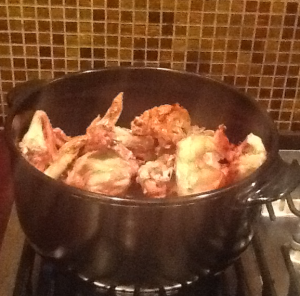Award Winning Author
Face Reading with Before & After Photos
Traditional Bone Broth (Gelatin)
There’s good reason why a traditional chicken soup is fondly dubbed “grandma’s penicillin.” A soup, broth or stock made with bones combats the flu by strengthening the immune system. It’s a classic protein-rich energy tonic that increases endurance and provides important nutrients. It’s no wonder that cooks world-wide and through the centuries have regarded silky, gelatinous, bone stock as an essential ingredient for savory dishes.
If you suffer from digestive issues, aim to use this elixir daily to effectively support your healing. Bone stock strengthens the gastrointestinal tract, veins, arteries, muscles, tendons, skin and bones. Because gelatin is concentrated protein, you may regard it as the original–and healthful–protein isolate.
How does purchased stock compare to home-made? Like cut glass to a diamond. Today’s commercial gelatin, derived only from hides and skin, contains protein but is not an energy tonic. Whereas, gelatin extracted from bones is remarkable and healing food providing calcium, minerals, glucosamine, chondroitin and collagen and the amino acids proline and glycine.
The secret to a bone energy tonic is long cooking with a little solvent such as vinegar or wine to extract nutrients. Because bones are dense it takes a long time to draw out all their nutrients. See Bone Stock recipe, Chicken Stock Recipe and to augment a stock with veggies, see Vegetable Stock.

I make a week’s supply of bone stock and use it liberally in any savory dish that calls for liquid. Or for a quick pick-me-up, I season it to taste and drink this consommé as an on-the-spot restorative. Expect your bone broth to have the flavor and energetic essence of the animal itself. You may use poultry, lamb, pork, beef or buffalo bones.


Rebecca,
I stumbled onto your website doing a search on cookware safety. I have read several of your pages and like what I have seen so far. I have been trying what I call a “flexitarian” diet, which means mostly vegetarian. Out of curiousity of what you might say concerning animal proteins and their role in health. Some really are opposed to meat consumption for health reasons. I see that your view here is different. Do you have an article that you have written concerning the reasons for your view? Your comments here are so brief.
I appreciate your site,
Thank you,
RB
Good question and I’ll soon blog the answer. Quick response: What works for you? So many people today cannot easily assimilate grains and therefore, meat is medicinal.